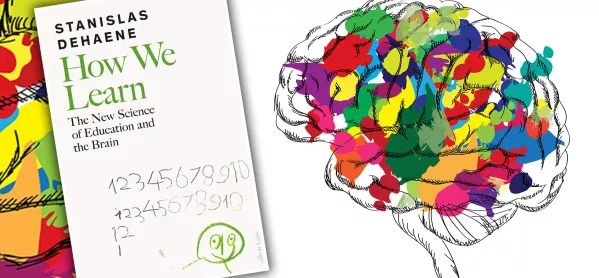- Home
- Book review: How We Learn
Book review: How We Learn

How We Learn: The New Science of Education and the Brain
Author: Stanislas Dehaene
Publisher: Penguin
Details: 331pp, £25.00
ISBN: 0525559884
Some books are to be savoured, others to be merely tasted. Some books are to be studied, whereas other books are to be enjoyed.
Reading How We Learn: The New Science of Education and the Brain by renowned neuroscientist Stanislas Dehaene, you are made to work hard and - at least for a reader like me - you may study and not savour the experience.
Reading Dehaene, along with commenting on his writing, is enough to invoke a little fear and timorousness. The career profile of this French author and brain scientist is enough to fill an endless cartoon scroll. Indeed, each page of his new book on learning effortlessly emits the intelligence of a towering intellect.
He continuously quotes a legion of philosophers, from Plato to Popper. His reach across the sciences is immense and you leave the book with a dizzying number of topics, from neural networks to Bayesian theory, explored in intensive academic detail.
There are welcome moments of levity, though. Puns about understanding the difference between Bill Clinton’s election and his erection pop up among this serious tour of academia, science and philosophy.
Hard to recall
He begins with a section on “What is Learning” framed by seven detailed definitions. Certainly, the theories and science here have seldom featured in my past teacher training.
From Descartes to machine learning, Dehaene draws repeated parallels between computer science and the near-infinite complexity of the human brain.
The are some interesting insights into artificial intelligence, but after this academic tour de force, I left not quite remembering what the seven definitions proved.
Terms such as “a priori hypotheses” bump into the “curse of dimensionality” as each page forces you to follow along with great care, but with slightly less interest.
I began to self-consciously chastise myself for being such a feeble-minded reader. Should this great researcher have to mediate his work so plainly for simpletons like me?
Well, I surmised that if he wanted to gain a wide readership, he might have to. Like the difference between a dense academic paper and a lively news article summary, I felt more of the latter was required to make comprehensible the former.
Lost in translation
There is a double translation Dehaene has to navigate. Shifting from French to English, given the complexity of the prose, was no doubt difficult.
But then, translating it further, so teachers and other busy professionals understand it, is a skill of its own.
I have read books playing on similar grounds in describing learning. Dan Willingham, professor of psychology at the University of Virginia, wrote a highly skilled attempt at translating the learning brain to busy teachers in his successful book Why Don’t Students Like School?
Another US expert, Benedict Carey, science reporter at The New York Times, did a very good job with a book that has the same title as Dehaene’s: How We Learn. Not only that, but cognitive psychological scientists Yana Weinstein and Megan Sumeracki and information designer Oliver Caviglioli also created a visual guide to learning.
Alas, each of them offers a more readable, accessible account than Dehaene does. Each of the aforementioned titles offers actionable insights for teachers.
If popularity is at least part of the aim, then making such popular science books compelling is best wedded to making the insights useful and useable too.
For example, another brilliant UK scientist, Sarah-Jayne Blakemore, professor of psychology and cognitive neuroscience at the University of Cambridge, offers a brilliantly readable account of the teenage brain that illuminates the brain science.
I certainly left the book with interesting nuggets. It is compelling when it homes in on language learning, such as how babies learn and how we all seek patterns in burned toast.
Practical insights, at last
Knowing the detailed machinations of the human brain is no doubt of interest. But what emerges from my distillation of this book is how much easier it is to learn when you explore the concrete interactions of people, and their intriguing stories, over the movements of microcircuits and neurotransmitters in the brain.
After plotting the pathway of human memories, the last third of the book moves onto more practical insights on attention and engagement.
I was actually more engaged in these better-characterised sections that balanced the science with some more vivid exemplification.
For teachers, this last section comes to life much more. Debates familiar to teachers, on discovery learning and explicit teaching, make a welcome appearance, along with motivation and curiosity.
The book ends with an exploration of how the brain consolidates learning. What was I left with? Well, there was no doubt a tremendous respect for the author’s towering intelligence, but I was left a little uninspired, too.
Perhaps it was lost in translation, or maybe it is my tired mind enduring a lengthy lockdown, but this book was just a little too hard to savour and enjoy.
Alex Quigley is the national content manager at the Education Endowment Foundation and he is the author of books for teachers. His latest book is Closing the Reading Gap.
You can support us by clicking the book’s title link: we may earn a commission from Amazon on any purchase you make, at no extra cost to you
Keep reading for just £1 per month
You've reached your limit of free articles this month. Subscribe for £1 per month for three months and get:
- Unlimited access to all Tes magazine content
- Exclusive subscriber-only stories
- Award-winning email newsletters



